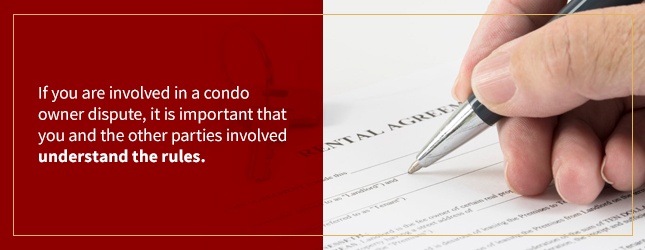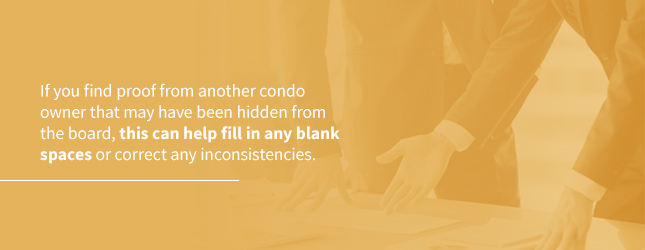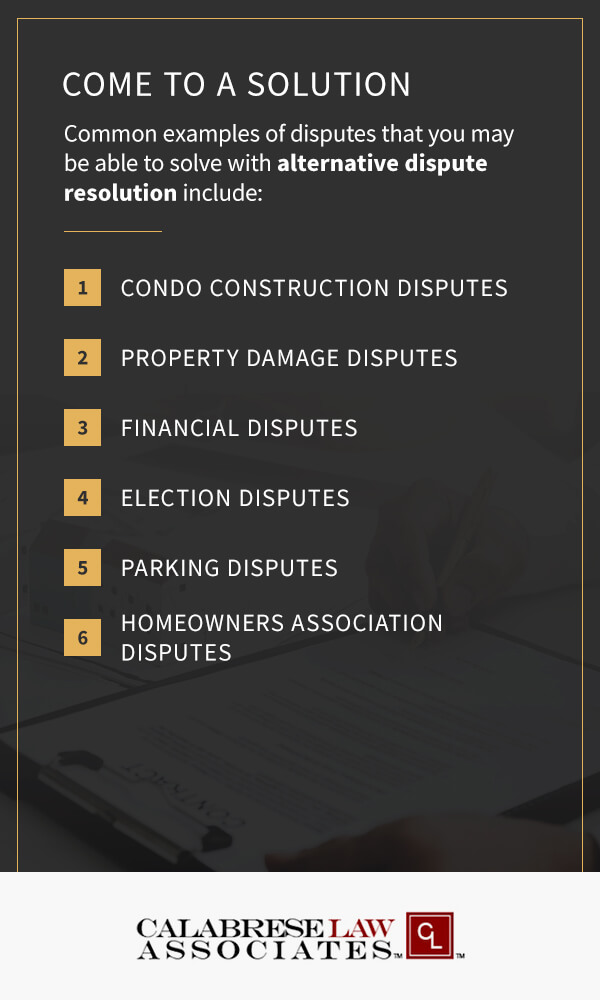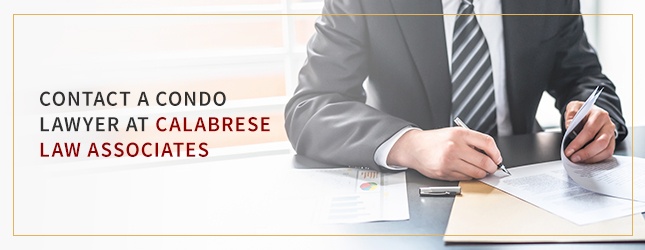For those who do not want to purchase a commercial building or a stand-alone, single-family home, condos are a popular alternative. In Boston, Massachusetts, and throughout the rest of the state, business owners and homeowners enjoy the advantages of condo ownership — like the low-maintenance lifestyle, lower purchase price, and use of common areas.
Unfortunately, condo owners may also face issues and disputes during their ownership of the space. At Calabrese Law Associates, our Massachusetts condominium law attorneys represent commercial and residential condominium units in Massachusetts. Some of the condo law cases our clients have been involved in include matters like the preparation of condo master deeds and Massachusetts homeowners association disputes. The following are some tips to help navigate a condo dispute and reach a suitable resolution.
Questions? Contact Our Attorneys Now
Jump to Section:
- Alternative Dispute Resolutions
- What is Mediation?
- What is Arbitration?
- How to Take Further Legal Action in a Condo Dispute
1. Understand the Condo Legal Dispute
When dozens of personalities live in a single space, conflict is inevitable. The key to navigating potential conflicts and disputes is understanding how they should be handled and resolved.
What exactly is the issue at hand? Many condo complaints come from the resident’s lack of awareness. You may be able to easily resolve these issues by speaking with neighbors, who may not even realize the problem exists. You and your neighbors may be able to reach a compromise and agree on a collective desire for a pleasant community and living experience.
However, if an issue cannot be solved, you may need to take further action. Is this the case for you? Contact our lawyers at Calabrese Law Associates today to get the help you deserve.
2. Review Legal Considerations
Next, review the regulation and laws that govern the condos in your jurisdiction. Typically, the rules are spelled out quite clearly. If you are involved in a condo owner dispute, it is important that you and the other parties involved understand the rules. For example, are there HOA rules in place about adding lawn ornaments or changing paint colors, or do these personalization’s fall outside what is included in HOA rules and could be up for dispute?
You have the right to expect that those living in the building with you act in accordance with established rules and regulations set by the association. If you choose to work with a condo attorney, he or she will apply their expertise in law to your situation and help you navigate the path to a solution.
3. Identify All Parties Involved
The next step in resolving condo disputes is identifying each of the parties involved. Sometimes, this can be a straightforward step, as the dispute may simply be between you and another condo owner. In other situations, an incident may take place in public where there were witnesses.
No matter what occurred, ensure you have a good understanding of what happened and what was heard. You may need to contact individuals who were witnesses to a negative incident, though they may not always be willing to act as official witnesses because of personal ties.
4. Hear Everyone’s Side and Collect Evidence
After you identify all the parties involved in the dispute, you may want to listen to each person’s side of the story to collect evidence about what really happened. This can give you an idea of each person’s different perceptions of the incident. If an issue is ongoing and complicated, you may want to try reconstructing a timeline, particularly if the case escalates to the board. Every party involved should provide a timeline of what occurred and when. Ask the parties involved for a list of what happened.
If possible, you may want to try reconstructing the incident using witness reports and video footage, especially for more acute issues. Identify what occurred to make the issue reach a boiling point, specifically who initiated the argument or incident. Pinpointing who started the dispute is a crucial step when you are attempting to resolve an issue.
5. Look for Inconsistencies
Your next step should be to look for inconsistencies in the statements made by the parties involved. For example, if you are in a dispute with a property manager and the property manager alleges non-response from you, but you have evidence of your response, you can show it to the property manager and request clarification.
When a person is confronted with inconsistencies in the dispute, his or her response will be quite informative. If the person acts defensive but is unable to offer any facts, this can tell you more about where things went awry. Additionally, if you find proof from another condo owner that may have been hidden from the board, this can help fill in any blank spaces or correct any inconsistencies.
6. Come to a Solution
If a condo legal dispute persists or is unable to be resolved, you may want to bring up your concerns to a property manager or condo board member. After you bring attention to the issue, the property manager will usually issue a warning or recommend a solution to the other party. At this stage, it may be useful for you to record communications between you and your neighbors and communications between you and your property manager or condo association board member via email or letter. This will ensure that everything is properly documented.
Alternative Dispute Resolution
To come to a solution, you may want to consider mediation and arbitration. In the law and regulations, the rules are typically laid out for mediation and arbitration under a system known as alternative dispute resolution, or ADR.
For issues facing condo owners, board members, shareholders, and managers, alternative dispute resolution can be a valuable tool. Common examples of disputes that you may be able to solve with alternative dispute resolution include:
- Condo construction disputes: Construction disputes between contractors and the building owner are common. A job may not have been finished, or there may be an issue with the quality of the work. Further, if noise is an issue due to condo construction, residents may have trouble sleeping or working.
- Property damage disputes: Additionally, you may face problems as a result of property damage. If a roof leak in a condo causes damage, your first inclination may be to sue. However, ADR can present another solution. In fact, mediation is quite common in condo property damage issues.
- Financial disputes: Disputes about finances, such as condo leasing, are also a frequent source of conflict. For example, a lien may be placed if you have not paid homeowners association dues.
- Election disputes: Election disputes are quite common, which is why many choose to have an election administered by an organization like the American Arbitration Association to avoid disputes.
- Parking disputes: Condo parking disputes involve disagreements about where a renter or owner has a right to park.
- Homeowners association disputes: A homeowners association dispute involves disagreements about what is permitted under HOA guidelines.
When working to solve these disputes, there are varying levels of action. On one end of the spectrum is negotiation, which involves the parties involved sitting together and discussing the issue or issues at hand. On the other end is litigation, which involves discovery, attorneys, judges, and final judgments. In the middle of negotiation and litigation are mediation and arbitration. Mediation is closer to negotiation, and arbitration is closer to litigation.
What Is Mediation?
Mediation occurs between the disputing parties and can take place at any time prior to or the following litigation. A third party participates in the mediation to facilitate a resolution. The mediator does not have the authority to bind the parties to a particular outcome. While a binding agreement is typically drawn up if a solution is reached, the mediator does not have any official power to establish this agreement. Instead, the solution needs to come from the disputing parties.
Mediation is also entirely voluntary. Most mediators will try to make every party feel comfortable and facilitate a feeling of trust. The parties involved will need to determine if they will create and follow a binding agreement. If both parties cannot agree on a solution, they can walk away without any repercussions.
What Is Arbitration?
Arbitration, on the other hand, is not voluntary like mediation. This is an adversarial proceeding in which the disputing parties will come together and listen to the judgments made by an arbitration panel. This panel is typically composed of one person or three people and will render a decision and award at the end that is final and binding.
The panel will likely be comprised of those who are experts in the field of your dispute, and the involved parties can select arbitrators for the dispute based on their expertise. This means you can choose an arbitrator who truly understands the field. Arbitration also has limited appeal rights, which can make this a more attractive option for some people.
How to Engage in Mediation or Arbitration
In some cases, you may be able to choose whether to participate in mediation or arbitration. In other circumstances, you may not have a choice. In many contracts, mediation or arbitration is included in the fine print to ensure the parties involved will attempt to resolve the dispute outside of court.
The following are the steps of mediation:
- The mediator will be chosen.
- The involved parties will be contacted for information, and these parties will need to submit mediation statements in which they describe the nature of the dispute, their positions, and what they are willing to settle for.
- During mediation, every party is together in a room and given time to discuss the issue they are facing.
- The mediator will then split parties into different rooms and speak to them individually.
- A mediator may then share his or her thoughts about the resolution the parties may be able to expect if the dispute is taken to court. The mediator will try to help the parties come to a resolution, such as a monetary solution.
- If the parties can come to an agreement, the mediator will help them create a binding agreement. If the parties do not come to an agreement, the mediator may discuss other options with them.
The following are the steps of arbitration:
- You and the other parties involved will discuss what type of arbitrator they would like.
- Every party will also need to agree on a suitable schedule to start on a path to resolving the disputes.
- In arbitration, each party will lay out his or her case, and attorneys will be present to represent their clients.
- The arbitration panel will make a decision.
Essentially, if you want to pursue a more non-confrontational option, mediation may be the right choice for you. If you want an option with more finality, you may want to pursue arbitration. If you have been unable to settle a condo dispute so far, you ideally will be able to resolve the issue in this step. However, if mediation is not successful, or you are not interested in trying to resolve the dispute via mediation or arbitration, you can take further legal action.
7. Take Further Legal Action
Finally, if you cannot come to a solution through other methods, you may want to take further legal action by hiring a condo attorney. At Calabrese Law Associates, our condominium lawyers in Boston and Burlington, Massachusetts can save you the time and hassle of reaching the desired outcome in your condo dispute.
In Massachusetts, condominium laws are complex and subject to change following court decisions and changes to regulations. We can provide you with a balance between practical solutions and strong court advocacy, along with legal advice before or after condo disputes arise. Our firm will dedicate the time needed to understand the factors that affect your claim so that we can provide sound legal counsel and help you achieve positive results.
Get in Touch With an Expert in Massachusetts Condo Law
At Calabrese Law Associates, our condo dispute lawyers are available for condominium owners who are facing disputes they want to resolve quickly and effectively. We prioritize being accessible to our clients, and we deliver legal representation to you for a reasonable fee. You deserve practical advice that leads to the outcome you desire. If you are looking to resolve a condo dispute or come to an HOA dispute resolution in Massachusetts, contact a condo lawyer at Calabrese Law Associates today.
While Calabrese Law Associates does offer legal help for landlord-tenant disputes, it is extremely rare that we take on these cases. Only about 1% of tenant-related cases and 10% of landlord-related cases will be considered by our law firm.
*This publication and its contents are not to be construed as legal advice nor a recommendation to you as to how to proceed. Please consult with a local licensed attorney directly before taking any action that could have legal consequences. This publication and its content do not create an attorney-client relationship and are being provided for general informational purposes only.
*Attorney Advertising. Prior results do not guarantee a similar outcome.







